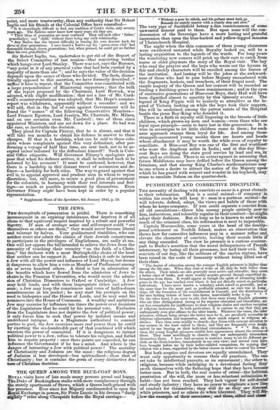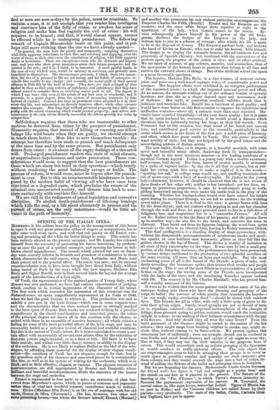PUNISHMENT AND CORRECTIVE DISCIPLINE.
THE necessity of dealing with convicts en masse is a great obstacle to their reformation. Man is a social animal—if company is within his reach he will keep it : man is a partisan animal—he will tolerate, defend, adopt, the views and habits of those with whom he keeps company. If you could separate a convict from all old associations—throw him among people entirely new to him, industrious, and tolerably regular in their conduct—he might adopt their fashions. But so long as he is known to and within reach of the criminal class, his reformation is next to impossible. Captain Maconochie, some years at the head of the doubly-- penal settlement on Norfolk Island; makes an observation that shows how far corrective influences may in a manner refine and elevate the character of convicts, leaving their morals little if any thing amended. The view he presents is a curious counter- part to Burke's assertion that the moral delinquencies of French aristocracy, by losing all their grossness; lost half their evil. The convicts of our day, like the noblesse of the ancien regime, have been raised in the scale of humanity without being lifted out of their class.
" The degree of education among the younger English prisoners is higher than' among the old ones. When they read or write at all, they do both better than• the others. Their minds are also generally more active and educable; they covet. a better class of books, and more readily acquire general though superficial in- formation from them. It would appear as though the spirit of advancing intelli- gence in the age has touched even where it has not directly seized on particular individuals. I have never known a voluntary adult school so generally, and at the same time for the most part so profitably attended, as oars was at Long ridge, till the formation of the establishment at Cascade, and the distribution of the men holding tickets of leave into farms, unavoidably broke it up. * • On the other hand, I am sorry to add, that these same young English prisonerti,- who are thus • hed among us for superior education and educability, are not less remarkable or indifference to their religions duties and careless reception of religions instruction. In both particulars it is curious to say that they not. unfrequently even give offence to the older hands. Whatever the cause, the older prisoners, without being always the better men for it, are peculiarly accessible to • religious exhortation and impression, and show much respect to religious ad- dresses. They thus come readily to church; they listen with extreme attention to any sermon in the least suited to them; and they are frequently even deeply moved by one bearing on their individual circumstances. • • " But, as a the young English prisoners exhibit here appearances almost the reverse of these. They come unwillingly to church; they not uufrequently misconduct themselves there. I have had occasion to sentence many to sit for different pe- riods on the front-benches, immediately in my own view; and several even have been brought before me by their better-minded companions, for arguing that' religion was a hoax, supported by the better classes in order to control the lower."
But both sceptics and devotees are equally unreclaimed. They want only opportunity to resume their old practices. The one set take to intellectual pursuits, as an amusement ; the other- to religious, because while indulging in a devotional feeling they sooth themselves with the flattering hope that they have become: better men. But in both, the real source of crime—the habittial- prostration of the will, the more or less reluctant submission to habit—has not been reached. They lack vigour for self-denial= and steady industry ; they have no power to originate a new line, of conduct for themselves ; they will do as they are directed while prisoners, and as others do when liberated. They will DA- lowtheextunple. of their associates ; and these, sifted and demi fed as men are now-a-days by the police, must be criminals. To reclaim a man, it is not enough that you render him intelligent and convince Lim of the folly of crime, or awaken his sense of religion and make him feel vaguely the evil of crime : his will requires to be braced ; and that, it would almost appear, cannot be effected while he is undergoing punishment. The following remark of Captain Maconochie bears on this point, and is per- haps still more striking than the one we have already quoted- " In general, the men here die quietly and composedly; resigning themselves with little apparent reluctance to their fate, and receiving. and applying, even the worst of them, to their own cases the consolations of religion, with little apparent doubt or hesitation. There are exceptions—men who die obdurate and impeni- tent, and men who show great uneasiness about their future prospects: but the reverse is the rule; and it is, I think, to be lamented. A more painful death, in the case of very wicked men, would be salutary to survivors, and probably more beneficial to themselves. The circumstance proceeds, I think, from two causes: first, the ties of a prisoner to life are not strong, and his habits of enterprise re- concile him readily to any change; and secondly, the moral guilt of their several offences is little felt by the body at large. They have for such a length of time looked to them as thew only sources of indulgence and subsistence, that they have almost ceased to consider them as involving moral guilt at all. The degree in which I can trace this even in the minds of my best men is wonderful; and it proceeds, in a great degree, from the system of measuring sentences by time instead of conduct. Conduct has thus no prominent value attached to it in their every-day life, and misconduct no directly injurious effect; while other circum- stances also conspire. Men long kept without personal property have little sym- pathy with the moral reasoning which would protect property; and where sub- missiveness is the only virtue directly rewarded, the others speedily lose value by comparison."
Self-defence requires that those who are inaccessible to other motives be deterred from crime by the prospect of punishment. Humanity requires, that instead of killing or coercing our fellow beings like wild beasts when they are giulty, we should attempt to teach them better. Men like to save themselves trouble : the attempt has therefore been made to punish and teach delinquents at the same time and by the same process. But punishment only deters from crime : it awakens all the angry feelings of a thwarted will. Prolonged punishment renders this state of mind chronic, or superinduces hopelessness and entire prostration. These con- aiderations would seem to suggest that the best punishments are those which are sharp but brief in their operation—which terrify without rendering the mind habitually savage or feeble. The process of reform, it would seem, must be begun after the punish- ment is over. But to this an insurmountable hinderance is inter- posed by the modern habit of viewing all who have once been convicted as a degraded castes which precludes the return of the criminal into unconvicted society, and thrusts him back to asso- ciate exclusively with convicts like himself. We are still in the rudiments of penal legislation and corrective discipline. To abolish death-punishment—if life-long bondage which kills the soul, or a life spent alternately inprisons and the pursuit of crime, are the only substitutes—would be little ad- vance in the path of humanity.



























 Previous page
Previous page